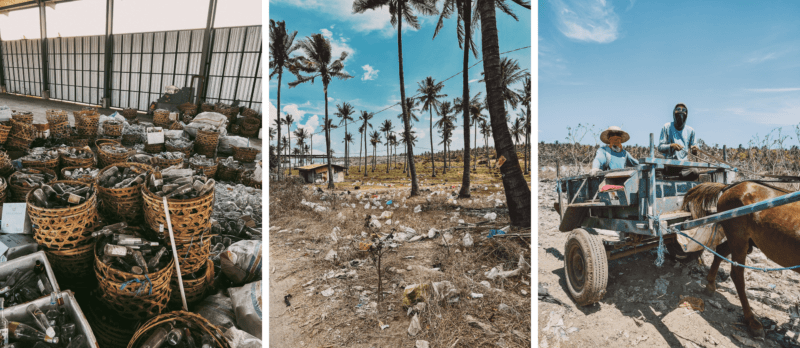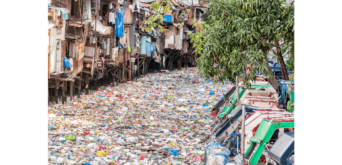Plastic pollution, an environmental injustice: the voice of the waste-pickers
Awareness and education
Plastic pollution
18 October 2023
"When people have nothing left, this is where they come".
Waste-pickers are men, women, often children.
Every day, in extremely dangerous and unhealthy conditions, they sort and extract materials that can be recycled from these immense landfills.
Where plastic waste is a precious resource, waste-pickers unite to call for the advent of a true circular economy, to stem this social and economic injustice. In Bali, The SeaCleaners works in partnership with local associations to improve waste management.

Whether at Mbeubeuss in Dakar, Senegal, Deonar in Mumbai, India, or Bekasi in Jakarta, Indonesia, in the mountains of waste of the world’s largest landfills, millions of workers repeat the same gestures, flee the same misery and face the same dangers.
The most dangerous job in the world?
In Bekasi, waste pickers, called “pemulung” in Indonesian, generally earn between 2 and 10 dollars a day from the plastic, metal, wood and electronic waste they collect. Even animal bones have value, as they are used to make jewelry, floor tiles or concrete (nytimes).
These workers in the informal economy are essential to preventing plastic pollution and to the functioning of a circular economy: in 2016, it was estimated that waste pickers were responsible for collecting 55-64% of plastics destined for recycling worldwide (Lau et al. 2020). Yet the situation is no longer acceptable in terms of human rights. The right to a clean, healthy and sustainable environment has been recognized as a human right since 2021.
Wherever they are in the world, waste-pickers generally come from some of the poorest and most marginalized social groups, and try to find a source of survival in waste-picking, at the risk of their lives.
They are on the front line of the harmful health effects of plastic pollution: by inhaling fumes from burning plastic and breathing air contaminated with microplastics, they are more vulnerable to infections and chronic illnesses.
In open-air dumps, where mountains of waste sometimes reach 70 meters in height, accidents are numerous and tragic: waste handling, collapses…
It’s not uncommon for waste pickers to die trying to reach the best materials dumped by trucks. In 2017, a gigantic landslide in an Addis Ababa landfill killed 113 people.

Essential profession, vulnerable workers
“Where we find social inequalities, we also find environmental and health inequalities, and vice versa” (David N. Pellow and Robert J. Brulle, 2018)
The precarious, dangerous and unequal conditions of millions of waste collectors around the world remind us that plastic pollution is an environmental injustice.
While the underground economy of informal waste recycling exists in every country, it is largely concentrated in developing countries, faced with rapid urbanization, and whose waste management infrastructures are inadequate. 80% of marine pollution comes from the coastal cities of the poorest countries.
Informal workers, who account for around 80% of the 19 to 24 million waste collectors, help to manage part of the waste stream generated locally, but also often imported directly from other countries.
Despite the essential role they play in urban areas overrun by waste and with unstable waste management systems that generate plastic pollution, their work is rarely valued, they struggle to earn a living and are exposed to abuse and exploitation.

The urgent need for better waste management on a global scale
To ensure better working conditions for these professions, it is necessary to act on the creation of waste management infrastructures, to reduce the immensity of open dumps, to be able to welcome waste-pickers in waste management services, where they can benefit from enhanced safety.
All over the world, waste management systems are under strain, and the influx of waste is such that landfill sites are overflowing and taking on proportions never seen before. The first response is to reduce global plastic consumption, especially of single-use plastics, and to market products with optimized durability and recyclability. There must be no more mountains of waste in landfill sites.
It is also essential to ensure a status for the profession of waste picker. During negotiations for a global treaty on plastics (the 4th session of which will take place in November 2023 in Nairobi), waste pickers will be present at the negotiating table to assert their rights, demand the mandatory use of recyclable materials and fair remuneration for their work.
Circular economy at the heart of negotiations
In Nairobi, the waste pickers will be advocating for the advancement of the circular economy in our societies. Waste recycling creates jobs: 6 times more than waste-to-energy 6 and 25 times more than waste-to-landfill.
By replacing the consumption of natural resources with labor, and slowing down the “throwaway” economy, the circular economy not only preserves raw materials, but also creates jobs.
In a circular economy, used products and materials are reintroduced into the production, distribution and use cycle, whenever possible. Waste becomes a resource in every loop of the circular economy, whether it’s recycling, remanufacturing, repairing or reusing goods, jobs are generated, mainly at local level.
The SeaCleaners' mission: Develop waste management infrastructures, employ and qualify sorting operators

In Bali, The SeaCleaners has developed the MAPP (Mobula Against Plastic Pollution) program to act on all stages of waste management. This includes waste collection by the Mobula 8 in the aquatic environment or on land, waste management through to recovery and recycling where possible, awareness-raising and training for local populations, with funding for waste collection aids (trucks, garbage cans)…..
In this way, The SeaCleaners works in partnership with local associations to improve local waste management infrastructure by optimizing sorting centers. The aim is to employ 30 to 40 local operators to run the new waste management model. These skilled jobs offer an alternative to underground waste collection: they guarantee optimum safety conditions, and a healthier, more controlled working environment.

Together, let’s work to ensure that the waste collection profession is valued and protected, and to lift workers out of vulnerability. You can take action with us.
To find out more and take part in the project ⬇️
Sources :
https://www.weforum.org/agenda/2022/12/waste-pickers-plastic-pollution-recycling-policies
L’atlas du plastique : https://fr.boell.org/fr/atlas-du-plastique
